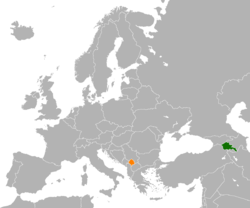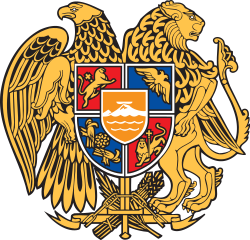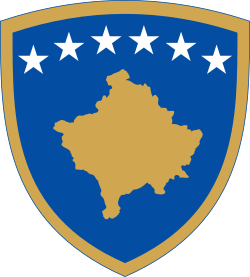Armenia–Kosovo relations
As of February 2018, Armenian-Kosovan relations are non-existent because Armenia has yet to recognize Kosovo's[a] independence.
 | |
Armenia |
Kosovo |
|---|---|
On 12 March 2008, President Serzh Sargsyan stated that "Armenia's possible recognition of Kosovo's independence will not strain the Armenian-Russian relations" but also noted that "Kosovo recognition issue needs serious discussion... Armenia has always been an adherent to the right of nations to self-determination and in this aspect we welcome Kosovo's independence."[1]
On 3 September 2008 President Serzh Sargsyan stated: "Today one is wondering from time to time why Armenia is not recognizing the independence of Abkhazia and South Ossetia. The answer is simple: for the same reason that it did not recognize Kosovo's independence. Having the Nagorno-Karabakh conflict, Armenia can not recognize another entity in the same situation as long as it has not recognized the Nagorno-Karabakh Republic". A nation's right to self-determination "takes times", requiring the understanding of "all interested parties". Accordingly, Armenia is trying to "convince" Azerbaijan to accept the loss of Karabakh, stated the president.[1][2] In November 2008, whilst commenting on Russia's recognition of Georgia's break away regions, Sargsyan said "In case with Kosovo the right of nations to self-determination was applied. However, Russia's similar step was given a hostile reception".[3]
At a meeting in May 2009 between the Kosovan Foreign Minister, Skënder Hyseni, and Armen Martirosyan, the representative of Armenia to the UN, Mr. Martirosyan reportedly promised that the request for recognition would be forwarded to his government.[4]
On a July 2009 state visit to Armenia, Serbian President Boris Tadić discussed the issues of Kosovo and Nagorno-Karabakh with Armenian President Serzh Sargsyan. The two leaders agreed that regional conflicts must be resolved without the use of force and only by peaceful means in keeping with international law.[5] Tadić also met with Prime Minister Tigran Sargsyan where the same issues were discussed. The Kosovo and Nagorno-Karabakh issues can only be solved through negotiations and "any imposed solutions are absolutely unacceptable and we fully agree on that," Tadić said afterwards.[6]
Notes
| a. | ^ Kosovo is the subject of a territorial dispute between the Republic of Kosovo and the Republic of Serbia. The Republic of Kosovo unilaterally declared independence on 17 February 2008, but Serbia continues to claim it as part of its own sovereign territory. The two governments began to normalise relations in 2013, as part of the 2013 Brussels Agreement. Kosovo is currently recognized as an independent state by 97 out of the 193 United Nations member states. In total, 112 UN member states recognized Kosovo at some point, of which 15 later withdrew their recognition. |
References
- "Armenia doesn't view Kosovo as precedent". PanArmenian.net. 2008-03-12. Retrieved 2009-03-31.
- Danielyan, Emil (2008-09-04). "Armenia Rules Out Abkhazia, South Ossetia Recognition". Armenialiberty.org. Archived from the original on 2008-11-09. Retrieved 2009-03-31.
- "Armenia can't recognize Abkhazia and South Ossetia before it recognizes Karabakh". PanArmenian.net. 2008-11-11. Retrieved 2009-03-31.
- "Paralajmërohen njohje të reja" (in Albanian). Telegrafi. 2009-05-28. Retrieved 2009-05-29.
- "Tadić ends Armenia visit". B92. 2009-07-29. Retrieved 2009-07-29.
- "Tadic and Sargasjan – full consent on conflict resolution". Radio Srbija. 2009-07-29. Archived from the original on 2011-07-21. Retrieved 2009-07-29.

